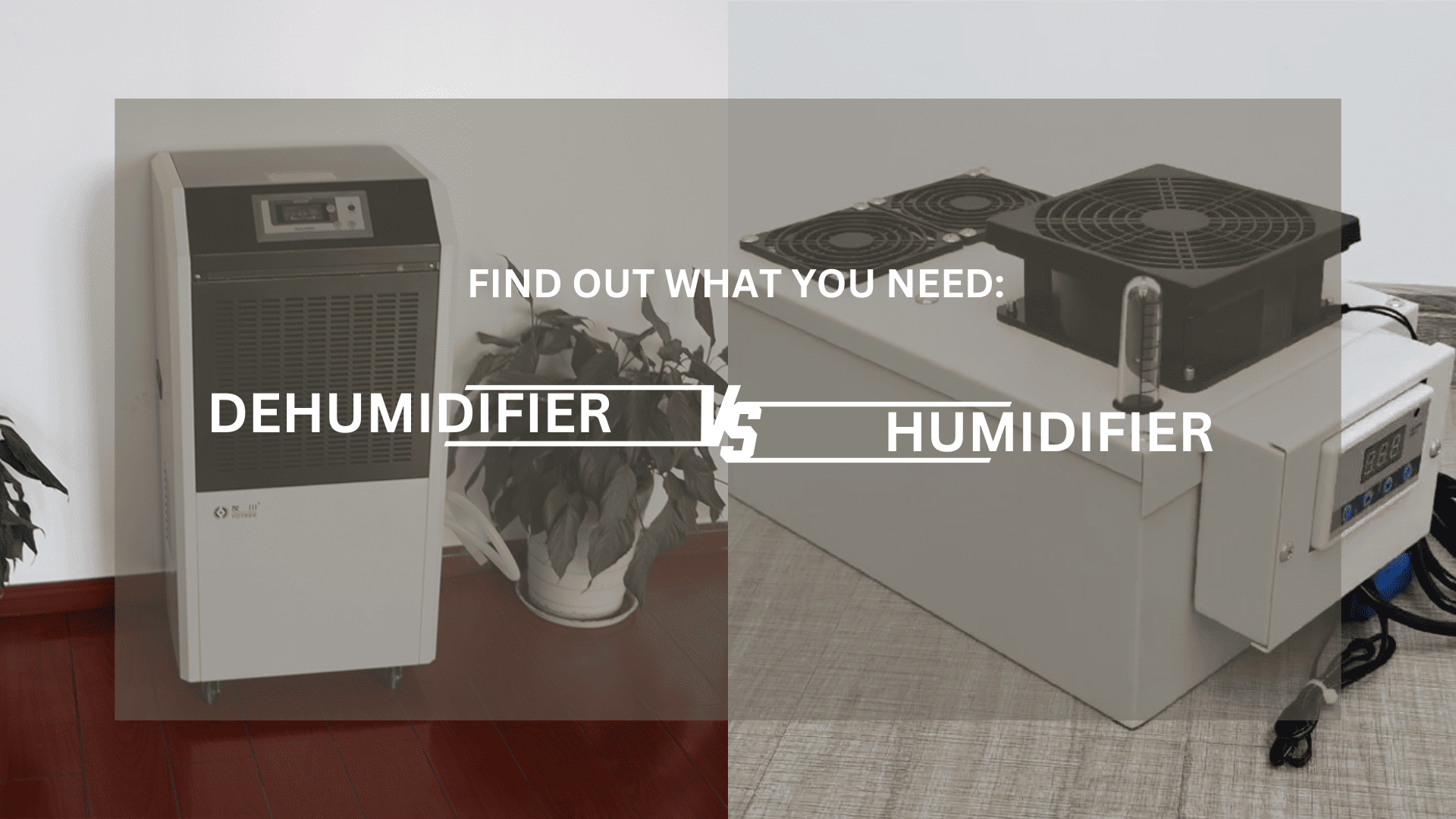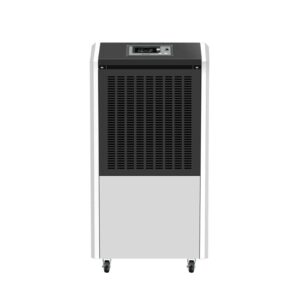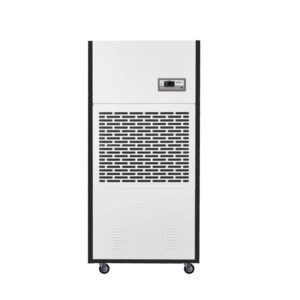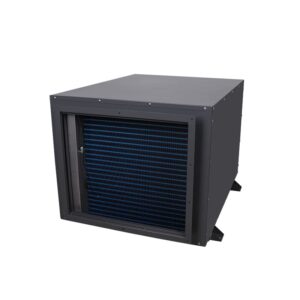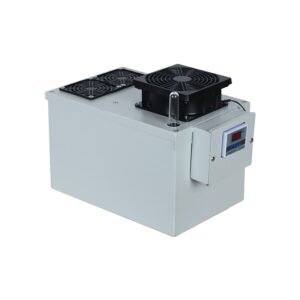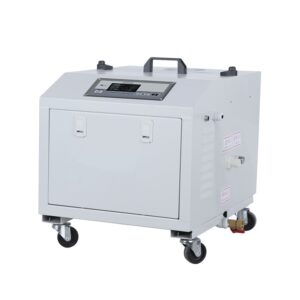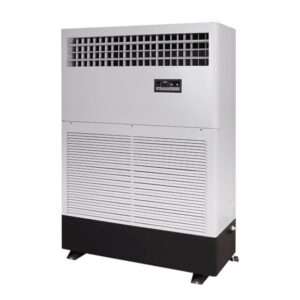Before jumping to the needs and applications of humidifiers and dehumidifiers, you must first understand what they are and what their respective functions are that make them different. This blog is invaluable for you if you are looking for a comprehensive guide about the implications of both and their potential benefits.

Difference Between Dehumidifier Vs Humidifier
What Is A Humidifier?
A humidifier is a device used to add moisture to the air in dry areas. It works on the simple principle of emitting water vapours in the air, leading to a balanced humidity level. It is also widely used in winter when the air is already dry, and the constant use of heaters may cause dryness in a room or enclosed space.
Benefits Of Using A Humidifier
The notable benefits of running an industrial humidifier are:
- Improvement In Air Quality
The humidifier improves the overall air quality at your workplace. It helps achieve the right balance needed for the optimised working of the machinery and the workers, eliminates odours and allergens from the air, and protects wooden furniture and infrastructure from cracking.
- Helps In The Reduction Of Static Electricity
One of the foremost benefits of humidifiers in an industrial setup is the reduction of static electricity. The dryness in the air may cause the static electricity between the materials and equipment to increase. Installing a humidifier disperses the electric charges, reducing the static electricity.
- Regulating Humidity Level Needed For Certain Goods Production
A humidifier comes in handy when manufacturing several products that can’t be produced correctly if the air is too dry. This dryness proves to be a hindrance in the mixing and settling of many food products and also causes cracking or inconsistency. A humidifier is used to overcome the issue.

What Is A Dehumidifier?
A dehumidifier works in contrast to a humidifier. It is a device that reduces the excess moisture from the air, lowering the humidity level. It works by condensing the air’s moisture and sending the moisture-free air back to the environment. Their application is most common in summer as they are highly humid.
Benefits Of Using A Dehumidifier
An industrial dehumidifier gives numerous benefits, which are given below:
- Prevention Of mold And Mildew
A dehumidifier keeps mold and mildew at bay. Excess humidity in the air may lead to mold and mildew growth, eventually damaging raw materials and finished goods. Also, the condensation may be one of the reasons for mold growth that an industrial dehumidifier can rightly control.
- Prevention From Corrosion
The dehumidifier removes excess dampness from the air, minimizing the oxidation of metal objects and leading to the least risk of rust and corrosion to equipment and machinery. It eventually increases the lifespan of the machinery and reduces its wear and tear to a limited extent.
- Prevention From Condensation
The water content in the air may lead to condensation on walls, windows, pipes, and glass doors, especially in winter, due to the temperature difference indoors and outdoors. At your workplace, a dehumidifier regulates the level of humidity and prevents condensation.
- Preserve Raw Materials And Finished Goods
A stable humidity level is crucial for preserving the warehouse’s raw materials and finished goods. It’s necessary for maintaining the quality and crispness of the products and increasing their shelf life.
- Helps In Specific Goods Production
Many products require specific manufacturing criteria, including humidity levels. The humidity levels differ for each industrial application, such as the food industry, pharmaceuticals, chemicals, or wooden products. A dehumidifier helps significantly maintain the proper humidity level for the purpose.

Comparison Table
| Points Of Difference | Humidifier | Dehumidifier |
| Purpose | Adding moisture to the air | Removing moisture from the air |
| Power Consumption | Less power consumption | More power consumption |
| Working Mechanism | Adds moisture either through steam or ultrasonic vibration | Decrease moisture from air by condensing down the water or by absorbing the moisture |
| Most Suitable Season | Winters | Summers |
| Humidity Level | Ideal for humidity levels less than 30% | Ideal for humidity levels of more than 50% |
| Types | Steam humidifier, ultrasonic humidifier and evaporative humidifier. | Compressor dehumidifiers, Desiccant Dehumidifiers |
When To Use Dehumidifier Vs Humidifier?
While both have their distinct place in many industrial setups, they are mandatory for the manufacturing, packaging and storing of several goods. Let us explore further to decide about when to use dehumidifier vs humidifier
Dehumidifier Vs Humidifier For Mold
When concerned about mold or mildew in your workplace, you should use a dehumidifier, as it removes excess moisture and dampness from the air. Excess moisture in the air is the root cause of mold growth. On the other hand, a humidifier adds moisture to dry air. And If the running of the humidifier is not monitored correctly, the increased relative humidity level in the air can give rise to mold and mildew instead of preventing it.
Dehumidifier Vs Humidifier In Protecting Machinery
In a manufacturing business, a dehumidifier and humidifier are run side by side. The need for a humidifier or dehumidifier is decided depending on whether the air is too dry or too moist.
If the air is too moist, an industrial dehumidifier protects the machinery from corrosion and rust, which may affect its working and efficiency. In contrast, if the air is too dry, an industrial humidifier protects the machinery from the risk of static electricity.
Dehumidifier Vs Humidifier For Cold Storage
Usually, cold storage will require a dehumidifier, not a humidifier. Cold storage may be vulnerable to sources of moisture, increasing the humidity level. The ice buildup may harm the freezing equipment or lights in the storage facility. Furthermore, it may cause ice frost on stored goods, ice buildup on the floors, condensation, or, in extreme cases, lead to mold growth in the stock. Moreover, some goods require low humidity levels to retain their freshness.
However, there may be rare cases when a humidifier is needed to store fresh products or vegetables.
Dehumidifier Vs Humidifier For The Food Industry
In the food industry, both humidifier and dehumidifier have their peculiar application, depending upon the humidity level of the area and the specific requirements of different types of food.
A humidifier is needed to maintain the texture and freshness of bakery items, meat, and fresh products in the food industry. On the other hand, cereals, grains, spices, powdered products, and dry products in the food industry need a dehumidifier to prevent mold and clumping.
Dehumidifier Vs Humidifier For Pharmaceuticals
Both humidifiers and dehumidifiers are used in pharmaceuticals, with the dehumidifier’s share slightly higher than that of the humidifier. This is because of the widespread use of dehumidifiers for manufacturing tablets and capsules that need controlled humidity. It not only helps in the manufacturing process of medicines but is also essential to maintaining the smooth binding and coating of tablets and capsules and the right consistency of the liquid medicines.
Dehumidifier Vs Humidifier For Greenhouse
You will need a dehumidifier more than a humidifier in a greenhouse. Natural processes like transpiration generate enough humidity in the greenhouse, reducing the need to run any humidifier. Moreover, the excess plants and the lack of ventilation in the enclosed space are yet another reason why there is already an increased level of humidity in the greenhouse. A dehumidifier is run in the greenhouse to remove the excess moisture and bring down the humidity level, which in turn decreases the risk of mold and fungi in the plants.
The Bottom Line
To cut it short, deciding between a humidifier and a dehumidifier depends on environmental conditions and the nature of industrial activity. This guide would have been helpful in explaining both scenarios. Let us help you select the best humidifiers and dehumidifiers for your industry, which will certainly prove to be your long-term investment.

